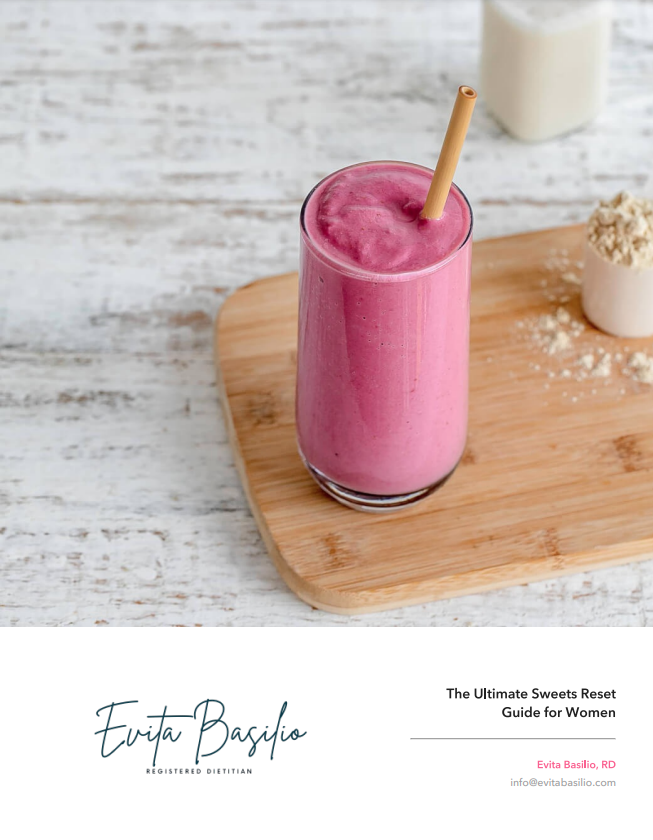Marketing your nutrition business can often feel like a never-ending task. What better way to market your services and grow your business than to leverage the power of others? Word-of-mouth referrals are an often overlooked marketing strategy, but they're a powerful way to get more people talking about what you're offering and telling others how great it is.
We caught up with Stephanie Long, That Clean Life Ambassador and Business Coach for Nutritionists, to learn key strategies to spread the word about your nutrition business. She’s a registered holistic nutritionist, culinary nutrition expert, and host of the podcast Next Level Nutrition Biz.

As an expert in helping nutrition professionals build authority, Stephanie offers three strategies to get more word-of-mouth referrals:
- Connect with colleagues
- Approach other health practitioners
- Incentivize current or past clients
Before diving into these three strategies, Stephanie explains why referrals can be a game-changer in your business and how to position yourself as an authority and expert to receive referrals.
Why Referrals Can Be a Game-Changer in Your Business
A flow of authentic referrals is one of the best ways to create a nutrition business deeply rooted in trust and authority. Referrals can support your growth in many ways, which Stephanie explains below.
They’re an effective way to organically grow your business.
We don’t know anyone who loves sending cold pitches that feel impersonal or intrusive. Instead, referrals arise naturally from satisfied clients who believe in the value of your services.
When people refer friends, family, or colleagues, they’re essentially vouching for you. This word-of-mouth marketing taps into existing networks and relationships, reaching people who are more inclined to listen. This can become a continuous cycle that stimulates organic growth.
They allow you to build a more consistent income.
By leveraging satisfied clients and professional networks to provide referrals, you establish an ongoing source of new business. Sporadic marketing efforts may have unpredictable results. Referrals offer a steady stream of potential clients who already have some degree of trust in you based on the recommendation of someone they like.
These leads are more likely to support your income stability. Plus, loyal clients who refer others often become repeat customers themselves.
They increase trust and credibility.
A personal recommendation carries significant weight. Potential clients are more likely to trust the advice of someone they know rather than relying on advertising or internet reviews from strangers. As referrals flow in, your positive reputation grows, positioning you as a credible authority.
They create a network of practitioners you can refer to.
As you establish relationships with others, you learn more about their specific needs and goals. This is helpful for your practice, but when audience needs fall outside your scope, you want trusted people to refer them to. Stephanie says, “Referrals are not just about receiving referrals for your business, but it's also about referring out. 64% of marketing executives agree that referrals are the most effective form of marketing, bringing in five times more sales than paid media.”
How to Position Yourself as an Authority and Expert to Receive Referrals
To get word-of-mouth referrals, you have to be seen as an expert in your niche. Stephanie says several essential steps will help over time, creating long-term credibility:
- Get clear on your niche. Who do you help and how do you help them? And what is the transformation you're providing? This is critical to make sure the right people find you.
- Create educational content. The more educational content you create, the more authority and expertise you become in this topic or in this niche. The more people read and see this, the more authority you build, with more people seeing you as an expert.
- Continue learning. Keep building your knowledge by obtaining additional certifications and completing ongoing education. This helps you stay on top of current science and remain an authority in your space.
- Put yourself in front of more audiences. Speaking at conferences, workshops, or community events allows you to showcase your expertise and reach new audiences. It also helps you become more confident, which supports your position as an expert. Get your name, face, and brand in magazines, podcasts, blog posts, or local news outlets.
Strategies to Get More Word-of-Mouth Referrals from Nutrition Colleagues and Health Practitioners
How to get more referrals from your colleagues and other health practitioners
Stephanie highlighted several action tips to encourage more referrals from colleagues within your network:
- Join professional associations
- Participate in online communities
- Attend networking events
- Have a presence on social media so people can find you
- Look for opportunities for collaboration with others who can help elevate your authority
- Consider joining alumni networks to connect with people who have similar schooling
How to approach colleagues for referrals
It may feel awkward asking colleagues for referrals, but it doesn’t need to be. Stephanie shared the strategy she recommends.
First, introduce yourself through an email, phone call, direct message, or in person at an event and explain who you are. Stephanie suggests expressing admiration for the work this person does. This can help open the conversation to tie in your background and expertise and form a connection.
Next, she recommends acknowledging the practitioner and the value of the client relationships they’ve built. Telling them you’ve noticed and appreciated the work they put into growing their practice can go a long way.
Finally, Stephanie says to outline the benefits their clients would receive from your services. Give them a clear purpose for why their clients should work with you. For example, perhaps you have specialized expertise that can build upon what they’re offering without stepping on anyone’s toes.
"At the end of the day, there’s a mutually beneficial relationship to build upon, even if you’re in a similar space. A collaborative approach should always be emphasized, so make sure they’re aware that you’re open to reciprocating referrals or collaborating on future projects."
You can also sweeten the deal with a referral commission. For example, for every client you receive from them, they would receive a commission from you, and vice versa. Stephanie explains, "In industry standards, it's usually 10 to 20% of the consultation commission or program price. You can also find a commission rate that works best for you and is mutually beneficial for all involved."
Download the Pricing Handbook now to optimize your pricing strategy for your meal planning services and programs.
It may not always be the right fit or the right timing, so she emphasizes the importance of respecting boundaries. “Just thank them for considering it,” she says. Keep the door open, keep things positive, and let them know that you're really appreciative that they considered it.”
Did you know That Clean Life has an affiliate program? Learn more about how it works here.
How to Incentivize Current or Past Clients for Referrals
To incentivize clients to give referrals, you have to provide excellent service. After all, Stephanie says, satisfied clients are more likely to recommend you, so focus on delivering exceptional experiences people will remember. “The more you put out, the more you’ll get back,” she notes.
Another option is to create a client incentive or loyalty program to reward your clients for each new referral they send. This could be a discount on a future service, a free session, or a small gift.
Some examples include:
- For every three clients they send, they get a 30-minute free consultation with you
- Free meal plan or guide
- Free supplements or product discounts (e.g. if you’re using a platform like Fullscript, you could temporarily increase the discount to incentivize referrals)
- A gift basket of local goodies, a financial incentive, or a gift card to a relevant business they would appreciate
- Host a friendly referral contest and offer prizes for clients who refer the most new clients to you within a defined period
Use That Clean Life to create your free gift like a meal plan or recipe book.

Stephanie says the best thing to do here is to choose something that feels good to you and you have a realistic amount of time to offer. Then, when you do receive those referrals, send a thank you note to show appreciation. Not only is this just kind, but it also encourages them to continue referring others and creates a positive relationship dynamic.
Word-of-Mouth Referrals: The Takeaways
To recap, here’s a quick referral checklist you can follow to help build your authority and keep the referrals coming from colleagues, other health practitioners, and past clients:
- Niche down
- Network and collaborate
- Ask for referrals directly
- Send referrals for others you trust
- Provide exceptional service always
- Incentivize referrals
- Send thanks
Learn more about Stephanie and her Nutrition Business Club here.

Plus, watch a demo to see how That Clean Life can help you create beautiful nutrition plans for your clients.

